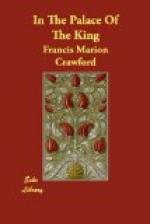He wore without exaggeration the military dress of his time,—a beautifully chiselled corslet inlaid with gold, black velvet sleeves, loose breeches of velvet and silk, so short that they did not descend half way to the knees, while his legs were covered by tight hose and leather boots, made like gaiters to clasp from the knee to the ankle and heel. Over his shoulder hung a short embroidered cloak, and his head covering was a broad velvet cap, in which were fastened the black and yellow plumes of the House of Austria.
As he came near to the gate, many friends moved forward to greet him, and he gave his hand to all, with a frank smile and words of greeting. But old Mendoza did not dismount nor move his horse a step nearer. Don John, looking round before he went in, saw the grim face, and waved his hand to Dolores’ father; but the old man pretended that he saw nothing, and made no answering gesture. Some one in the crowd of courtiers laughed lightly. Old Mendoza’s face never changed; but his knees must have pressed the saddle suddenly, for his black horse stirred uneasily, and tried to rear a little. Don John stopped short, and his eyes hardened and grew very light before the smile could fade from his lips, while he tried to find the face of the man whose laugh he had heard. But that was impossible, and his look was grave and stern as he went in under the great gate, the multitude cheering after him.
From her high window Dolores had seen and heard also, for she had followed every movement he made and every change of his expression, and had faithfully told her sister what she saw, until the laugh came, short and light, but cutting. And Inez heard that, too, for she was leaning far forward upon the broad stone sill to listen for the sound of Don John’s voice. She drew back with a springing movement, and a sort of cry of pain.
“Some one is laughing at me!” she cried. “Some one is laughing because I am trying to see!”
Instantly Dolores drew her sister to her, kissing her tenderly, and soothing her as one does a frightened child.
“No, dear, no! It was not that—I saw what it was. Nobody was looking at you, my darling. Do you know why some one laughed? It hurt me, too. He smiled and waved his hand to our father, who took no notice of him. The laugh was for that—and for me, because the man knew well enough that our father does not mean that we shall ever marry. Do you see, dear? It was not meant for you.”
“Did he really look up at us when you said so?” asked Inez, in a smothered voice.
“Who? The man who laughed?”
“No. I mean—”
“Don John? Yes. He looked up to us and smiled—as he often does at me—with his eyes only, while his face was quite grave. He is not changed at all, except that he looks more determined, and handsomer, and braver, and stronger than ever! He does each time I see him!”
But Inez was not listening.




